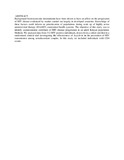Socio-economic determinants of disease progression among HIV infected adults in Kenya

View/
Date
2015Author
Gitahi–Kamau, Nyawira T
Kiarie, James N.
. Mutai, Kenneth K
Gatumia, Beatrice W.
Gatongi, P M
Lakati, A
Language
enMetadata
Show full item recordAbstract
Background
Socioeconomic determinants have been shown to have an effect on the progression of HIV disease evidenced by studies carried out largely in developed countries. Knowledge of these factors could inform on prioritization of populations during scale up of highly active antiretroviral therapy (HAART) constrained health systems. The objective of this study was to identify socioeconomic correlates of HIV disease progression in an adult Kenyan population.
Methods
We analysed data from 312 HIV positive individuals, drawn from a cohort enrolled in a randomized clinical trial investigating the effectiveness of Acyclovir in the prevention of HIV transmission among serodiscordant couples. In this study we included individuals with CD4 counts ≥ 350 cells/mm 3 and World Health Organization (WHO), clinical stage one or two. The exposure variables measured were: - daily household income available for expenditure, age, gender, housing type and level of formal education. We used a composite outcome of disease progression to WHO clinical stage 3 or 4 or a laboratory outcome of CD4 count below 350 cells/mm 3 after two years of follow-up. Logistic regression was used to determine associations of variables that were found to be significant at univariate analysis, and to control for potential confounders.
Results
Seventy eight (25 %) individuals reported HIV disease progression. Majority (79.9 %) were female. The median age was 30 year and 93.6 % had attained a primary level of education. Median CD4 at enrolment into the clinical trial was 564 cells/mm 3 ; those who had disease progression were enrolled with a significantly (p < 0.001) lower CD4 count. Daily household income available for expenditure adjusted for CD4 count at enrolment was associated significantly (p = 0.04) with HIV disease progression. Disease progression was five times more likely to occur in study subjects with daily income available for expenditure of less than US$1 compared to those with more than US$ 5 available for daily expenditure [adjusted Odds Ratio 4.6 (95 % Confidence Interval 1.4–14.4)]. Disease progression was not associated with age, gender, type of housing or level of education attained (p < 0.05).
Conclusion
Populations with low household incomes should be considered vulnerable to disease progression and should therefore be prioritized during the scale up of HAART for treatment as prevention.
Citation
Gitahi–Kamau, Nyawira T., Kiarie, James N., Mutai, Kenneth K., Gatumia, Beatrice W., Gatongi, P M and Lakati, A (2015). Socio-economic determinants of disease progression among HIV infected adults in Kenya. BMC Public Health 2015, 15:733Publisher
University of Nairobi
Collections
- Faculty of Health Sciences (FHS) [10415]
